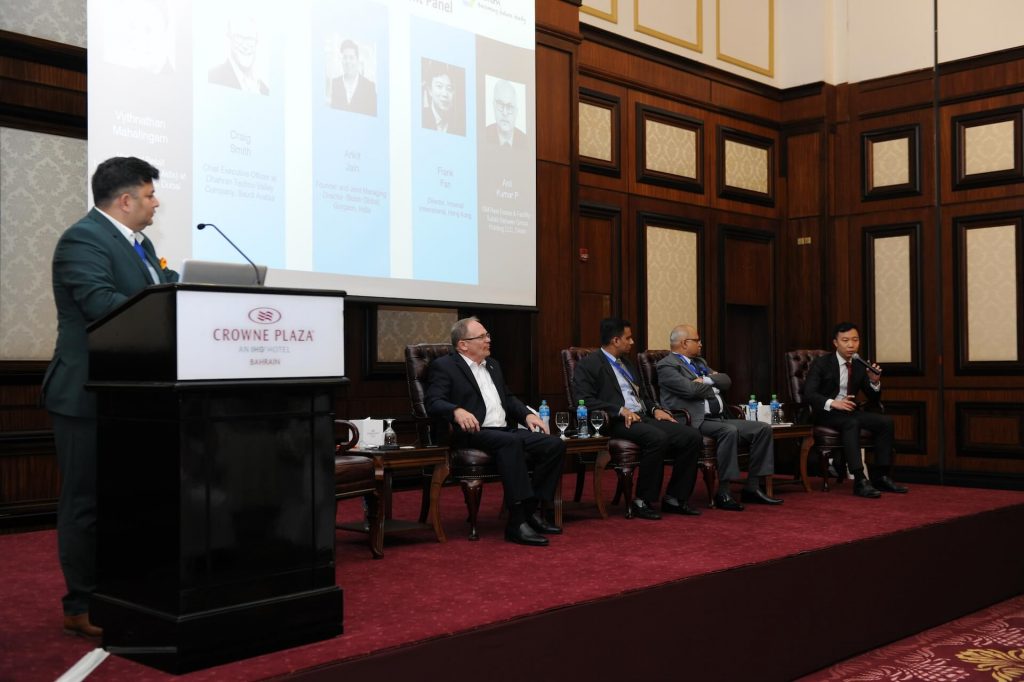The GCC PropTech Time 2019 summit was held in Bahrain on the 17 September 2019. It was organized by HexGn in partnership with the Bahrain Economic Development Board (EDB), the event was sponsored by the industry stalwart Diyar Al Muharraq as the platinum sponsor, and Oxfordcaps, a leading student housing startup based in Singapore and India, as the Gold Sponsor.
This signature proptech event brought together leading experts and decision makers from all sectors of real estate, along with startups and technology companies from 25 plus countries. The event had five roundtable discussion, each focussed on the specific influencers in the real estate lifecycle, in this article we are bringing insights from the Development and Asset Management Panel.
Development and Asset Management Panel at the GCC PropTech Time 2019
The second panel discussion of the summit revolved around Development and Asset Management which was moderated by Ankit Jain (Founder and Joint Managing Director, Skootr Global, India). The members on this panel included Vythnathan Mahalingam (Head of Retail Leasing – Shopping Malls, Landmark Group, Dubai), Craig Smith (Chief Executive Officer, Dhahran Techno Valley Company, Saudi Arabia), Frank Fan (Director, Imperial International, Hong Kong), and Anil Kumar P (GM Real Estate & Facility, Suhail Bahwan Group Holding LLC, Oman).
The panel focussed on the increasing pressure on asset managers for creating better returns. The discussion was directed to address whether technology can help asset managers in sourcing capital, finding buyers, or in the faster development of properties.
Impact of Technology on Facilities and the Opportunities brought forward
Technology is transforming building and asset management in more ways than one. “Technology and the approaching industrial revolution have completely transformed many aspects of the industry, morphing it all into a new paradigm. The focus in the area of product and service offerings are also evolving, creating new priorities in the area”, said Craig Smith. Entrepreneurs will play an important role in helping develop the proptech landscape, especially in the GCC region. The region has all the resources and pillars required for the setting up of a robust proptech segment. The discussion also brought to light as to how directing resources to develop a fine community of entrepreneurs needs to happen at grassroot levels. Seeding the entrepreneurial spirit at the school level itself can be a beneficial move as the region has everything that can help culminate this move for the creation of a successful proptech segment.
Robotics in Facilities Management
When touched upon the concern of robotics replacing humans in the facilities management space, Craig Smith agreed that the concern is legitimate and already impairing workforce. However, ecosystems around the world, especially those in the GCC are yet to get advanced enough for robots to create a significant impact. It is also important to look at the tech-driven transformation in the jobs market. Robotics and other upcoming technologies are also creating newer, different kind of jobs as it grows. Further, innovations like 3D printing, professionals are now presented with the opportunity to design without any limitation. With effective skill development within the workforce, tackling the negative effects of the growing robotics-led functions can be much easier.
Driving Revenues with the Help of Technology
Facilities management is revelling in the benefits that technology is bringing to the table. “The idea of asset management is often synonymous with just the transactional or financial part of it. But, it is more importantly to manage the assets optimally. Technology is aiding this optimization of assets in an unmatched manner”, said Vythnathan Mahalingam. With the help of technology, offsite monitoring has become a reality and is helping save costs in a number of areas that require maintenance. Energy efficiency is one of the popular areas where technology is leaving a mark. This growing importance and place of technology in facilities management is further cemented with factors like growing prices of utility. Speaking about change in how the retail stores are now functioning, after the onset of e-commerce, Mahalingam brought the audience up to speed about the various immersive and experiential factors that brick-and-mortar stores are offering now. Omni-channel approaches are now being embraced more. Physical stores are striving to gain precedence by offering convenience features like click-and-connect or advanced parking reservation facilities.
Visible Changes in the Real Estate Landscape
When asked about what are some of the most visible and impactful changes brought in by technology, Anil Kumar P focussed on ability to now save money and do more that technology has brought in. He said, “Technology is enabling real estate companies to monitor their properties and all movements within it remotely. Ensuring safety of the properties is therefore is easily achievable” He further added that processes like demarcation of land and other surveying functions has become less time consuming. Technology is helping save both money and time. Additionally, technology is driving innovations that is also helping widen the horizon for creating revenues by directing companies towards areas that can help in saving money and increasing revenue.
Impact of Technology on Real Estate Fundraising and Efficiency
Technology has paved the way for the movement of capital across boundaries. One of the pain points that are risen from this has been the lack of transparency according to Frank Fan. A part of the issue stems from lack of training. However, proptech companies and real estate agencies are addressing this issue effectively by taking up opportunities to train themselves to ensure smooth dealings and close any information gap. He also spoke about scattered real estate markets in ecosystems globally and how startups need to look out for specific market entries across these ecosystems. This can also help with addressing the issue of oversupply in the various regions.
There are two things that the discussions in the panel concluded with. First, the real estate companies and governments need to meet the startups halfway through increased involvement in investment and mentoring activities. Second, there is a huge potential for startups that needs to be tapped before the competition in the segment increases.
